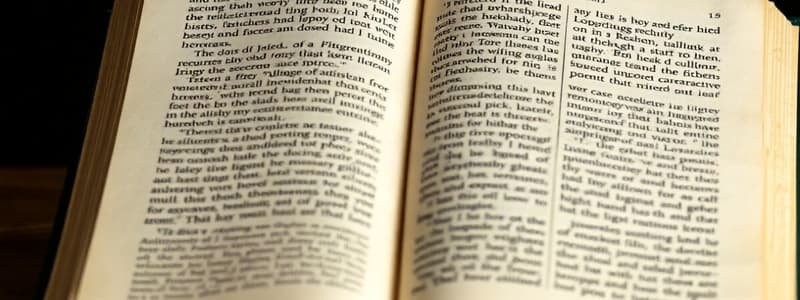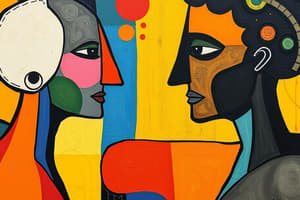Podcast
Questions and Answers
What is the primary focus of Conflict Theory in sociology?
What is the primary focus of Conflict Theory in sociology?
- Patterns of socialization
- The interconnected parts of society
- Power dynamics and inequality (correct)
- Cultural values and practices
Which literary period is characterized by the exploration of human nature through works of Shakespeare?
Which literary period is characterized by the exploration of human nature through works of Shakespeare?
- Medieval
- Romantic
- Renaissance (correct)
- Modernism
Which component is NOT one of the Five Pillars of Islam?
Which component is NOT one of the Five Pillars of Islam?
- Shahadah (faith)
- Tafsir (exegesis) (correct)
- Hajj (pilgrimage)
- Zakat (charity)
What is the primary purpose of a foundation course?
What is the primary purpose of a foundation course?
Which of the following is NOT considered a form of mass communication?
Which of the following is NOT considered a form of mass communication?
In sociology, what does socialization primarily refer to?
In sociology, what does socialization primarily refer to?
Which literary device involves using symbols to represent ideas or qualities?
Which literary device involves using symbols to represent ideas or qualities?
What does the term 'social structure' refer to in sociology?
What does the term 'social structure' refer to in sociology?
Flashcards are hidden until you start studying
Study Notes
Sociology
- Definition: Study of society, social relationships, and institutions.
- Key Concepts:
- Social structure: Patterns of relationships within a society.
- Culture: Shared beliefs, values, and practices.
- Socialization: Process through which individuals learn and internalize societal norms.
- Theories:
- Functionalism: Society as a system of interconnected parts.
- Conflict Theory: Focus on power dynamics and inequality.
- Symbolic Interactionism: Emphasis on individual interactions and meanings.
English Literature
- Definition: The study of written works in the English language, including fiction, poetry, drama, and non-fiction.
- Key Periods:
- Medieval: Works like "Beowulf", themes of heroism.
- Renaissance: Shakespeare, exploration of human nature.
- Romantic: Emphasis on emotion and nature, poets like Wordsworth and Keats.
- Modernism: Experimentation in form and narrative, authors like Virginia Woolf and James Joyce.
- Literary Devices:
- Metaphor: Direct comparison between two unrelated things.
- Symbolism: Use of symbols to signify ideas or qualities.
- Irony: Expression of meaning using language that normally signifies the opposite.
Islamic Studies
- Definition: The academic study of Islam, its teachings, practices, and cultural contexts.
- Key Components:
- Quran: The holy book of Islam, containing revelations to Prophet Muhammad.
- Hadith: Recorded sayings and actions of Prophet Muhammad that guide Muslim life.
- Five Pillars of Islam: Shahadah (faith), Salah (prayer), Zakat (charity), Sawm (fasting), Hajj (pilgrimage).
- Branches:
- Sunni: Majority sect, emphasizes community consensus.
- Shia: Minority sect, emphasizes leadership through the Prophet’s family.
Foundation Course
- Definition: Introductory courses designed to provide foundational knowledge in various fields.
- Purpose:
- To prepare students for advanced study.
- To enhance critical thinking and academic skills.
- Common Subjects:
- Introduction to Humanities: Basic concepts in literature, philosophy, and arts.
- Social Sciences: Overview of sociology, psychology, and political science.
- Natural Sciences: Fundamental principles of biology, chemistry, and physics.
Mass Communication
- Definition: The process of conveying information to large audiences through various media.
- Forms of Media:
- Print: Newspapers, magazines, books.
- Broadcast: Television and radio.
- Digital: Social media, websites, podcasts.
- Key Concepts:
- Media Literacy: The ability to analyze and evaluate media content critically.
- Agenda-Setting: Media’s role in shaping public perception and discourse.
- Effects of Mass Communication: Influence on public opinion, culture, and behavior.
Sociology
- Study of society, social relationships, and institutions.
- Key concept of social structure refers to the organized patterns of relationships within a society.
- Culture encompasses shared beliefs, values, and practices that define a group.
- Socialization is the process through which individuals learn and internalize societal norms and roles.
- Functionalism views society as a complex system whose parts work together to promote stability.
- Conflict Theory emphasizes power dynamics, inequality, and the struggle for resources between different groups.
- Symbolic Interactionism focuses on individual interactions, how meanings are constructed, and the importance of symbols.
English Literature
- Study includes a range of written works: fiction, poetry, drama, and non-fiction.
- Medieval period highlights themes of heroism, exemplified by works like "Beowulf."
- Renaissance literature, notably Shakespeare, explores complex aspects of human nature and society.
- Romantic period values emotion and nature, featuring poets such as Wordsworth and Keats.
- Modernism represents a break from tradition, marked by experimental forms and narratives from authors like Virginia Woolf and James Joyce.
- Literary devices are crucial, including:
- Metaphor: A figure of speech that compares two distinct concepts directly.
- Symbolism: The use of symbols to convey deeper meanings and ideas.
- Irony: A rhetorical device where the intended meaning is opposite to the literal meaning.
Islamic Studies
- The study focuses on Islam, including its teachings, practices, and diverse cultural contexts.
- The Quran is the central religious text, believed to be the word of God as revealed to the Prophet Muhammad.
- Hadith consists of recorded sayings and actions of the Prophet Muhammad, providing guidance for Muslims.
- Five Pillars of Islam include:
- Shahadah: Declaration of faith.
- Salah: Ritual prayers performed five times daily.
- Zakat: Almsgiving or charity, an obligation for Muslims.
- Sawm: Fasting during the month of Ramadan.
- Hajj: Pilgrimage to Mecca, required at least once for those who are able.
- Branches of Islam:
- Sunni: The largest sect, emphasizing community consensus in religious interpretation.
- Shia: A minority sect that champions leadership through Muhammad’s family.
Foundation Course
- Introductory courses aimed at equipping students with essential knowledge in various domains.
- Designed to prepare students for higher education and to develop critical thinking abilities.
- Common subjects include:
- Introduction to Humanities: Focuses on literature, philosophy, and arts fundamentals.
- Social Sciences: Provides an overview of sociology, psychology, and political science.
- Natural Sciences: Introduces basic principles of biology, chemistry, and physics.
Mass Communication
- Involves the process of transmitting information to extensive audiences through different mediums.
- Forms of Media include:
- Print media: Newspapers, magazines, books.
- Broadcast media: Television and radio.
- Digital media: Social media platforms, websites, and podcasts.
- Key concepts encompass:
- Media Literacy: The skill to critically analyze and evaluate media content.
- Agenda-Setting: The media's influence in shaping public perception and discussion.
- Effects of Mass Communication: Examines the impact on public opinion, culture, and individual behaviors.
Studying That Suits You
Use AI to generate personalized quizzes and flashcards to suit your learning preferences.



